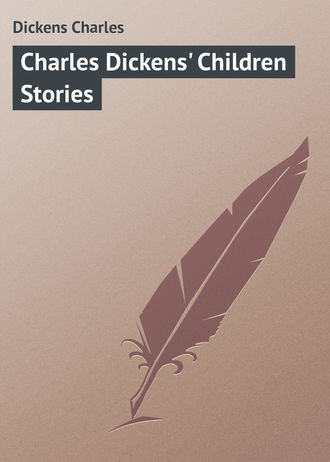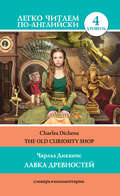
Чарльз Диккенс
Charles Dickens' Children Stories
LITTLE DOMBEY
LITTLE DOMBEY was the son of a rich city merchant, a cold, stern, and pompous man, whose life and interests were entirely absorbed in his business. He was so desirous of having a son to associate with himself in the business, and make the house once more Dombey & Son in fact, as it was in name, that the little boy who was at last born to him was eagerly welcomed.
There was a pretty little girl six years old, but her father had taken little notice of her. Of what use was a girl to Dombey & Son? She could not go into the business.
Little Dombey's mother died when he was born, but the event did not greatly disturb Mr. Dombey; and since his son lived, what did it matter to him that his little daughter Florence was breaking her heart in loneliness for the mother who had loved and cherished her!
During the first few months of his life, little Dombey grew and flourished; and as soon as he was old enough to take notice, there was no one he loved so well as his sister Florence.
In due time the baby was taken to church, and baptized by the name of Paul (his father's name). A grand and stately christening it was, followed by a grand and stately feast; and little Paul was declared by his godmother to be "an angel, and the perfect picture of his own papa."
But from that time Paul seemed to waste and pine; his healthy and thriving babyhood had received a check, and as for illnesses, "There never was a blessed dear so put upon," his nurse said.
By the time he was five years old, though he had the prettiest, sweetest little face in the world, there was always a patient, wistful look upon it, and he was thin and tiny and delicate. He soon got tired, and had such old-fashioned ways of speaking and doing things, that his nurse often shook her head sadly over him.
When he sat in his little arm-chair with his father, after dinner, they were a strange pair, – so like, and so unlike each other.
"What is money, papa?" asked Paul on one of these occasions, crossing his tiny arms as well as he could – just as his father's were crossed.
"Why, gold, silver and copper; you know what it is well enough, Paul," answered his father.
"Oh yes; I mean, what can money do?"
"Anything, everything – almost," replied Mr. Dombey, taking one of his son's wee hands.
Paul drew his hand gently away. "It didn't save me my mamma, and it can't make me strong and big," said he.
"Why, you are strong and big, as big as such little people usually are," returned Mr. Dombey.
"No," replied Paul, sighing; "when Florence was as little as me, she was strong and tall, and did not get tired of playing as I do. I am so tired sometimes, papa."
Mr. Dombey's anxiety was aroused, and the doctor was sent for to examine Paul.
"The child is hardly so stout as we could wish," said the doctor; "his mind is too big for his body, he thinks too much – let him try sea air – sea air does wonders for children."
So it was arranged that Florence, Paul, and nurse should go to Brighton, and stay in the house of a lady named Mrs. Pipchin, who kept a very select boarding-house for children.
There is no doubt that, apart from his importance to the house of Dombey & Son, little Paul had crept into his father's heart, cold though it still was towards his daughter, colder than ever now, for there was in it a sort of unacknowledged jealousy of the warm love lavished on her by Paul, which he himself was unable to win.
Mrs. Pipchin was a marvellously ugly old lady, with a hook nose and stern cold eyes.
"Well, Master Paul, how do you think you will like me?" said Mrs. Pipchin, seeing the child intently regarding her.
"I don't think I shall like you at all," replied Paul, shaking his head. "I want to go away. I do not like your house."
Paul did not like Mrs. Pipchin, but he would sit in his arm-chair and look at her. Her ugliness seemed to fascinate him.
As the weeks went by little Paul grew more healthy-looking, but he did not seem any stronger, and could not run about out of doors. A little carriage was therefore got for him, in which he could be wheeled down to the beach, where he would pass the greater part of the day. He took a great fancy to a queer crab-faced old man, smelling of sea-weed, who wheeled his carriage, and held long conversations with him; but Florence was the only child companion whom he ever cared to have with him, though he liked to watch other children playing in the distance.
"I love you, Floy," he said one day to her.
Florence laid her head against his pillow, and whispered how much stronger he was growing.
"Oh, yes, I know, I am a great deal better," said Paul, "a very great deal better. Listen, Floy; what is it the sea keeps saying?"
"Nothing, dear, it is only the rolling of the waves you hear."
"Yes, but they are always saying something, and always the same thing. What place is over there, Floy?"
She told him there was another country opposite, but Paul said he did not mean that, he meant somewhere much farther away, oh, much farther away – and often he would break off in the midst of their talk to listen to the sea and gaze out towards that country "farther away."
After having lived at Brighton for a year, Paul was certainly much stronger, though still thin and delicate. And on one of his weekly visits, Mr. Dombey explained to Mrs. Pipchin, with pompous condescension, that Paul's weak health having kept him back in his studies, he had made arrangements to place him at the educational establishment of Dr. Blimber, which was close by. Florence was, for the present, to remain under Mrs. Pipchin's care, and see her brother every week.
Dr. Blimber's school was a great hot-house for the forcing of boy's brains; and Dr. Blimber promised speedily to make a man of Paul.
"Shall you like to be made a man of, my son?" asked Mr. Dombey.
"I'd rather be a child and stay with Floy," answered Paul.
Miss Blimber, the doctor's daughter, a learned lady in spectacles, was his special tutor, and from morning till night his poor little brains were forced and crammed till his head was heavy and always had a dull ache in it, and his small legs grew weak again – every day he looked a little thinner and a little paler, and became more old-fashioned than ever in his looks and ways – "old-fashioned" was a distinguishing title which clung to him. He was gentle and polite to every one – always looking out for small kindnesses which he might do to any inmate of the house. "The oddest and most old-fashioned child in the world," Dr. Blimber would say to his daughter; "but bring him on, Cornelia – bring him on."
And Cornelia did bring him on; and Florence, seeing how pale and weary the little fellow looked when he came to her on Saturdays, and how he could not rest from anxiety about his lessons, would lighten his labors a little, and ease his mind by helping him to prepare his week's work. But one day, when his lessons were over, little Paul laid his weary and aching head against the knee of a schoolfellow of whom he was very fond; and the first thing he noticed when he opened his eyes was that the window was open, his face and hair were wet with water, and that Dr. Blimber and the usher were both standing looking at him.
"Ah, that's well," said Dr. Blimber, as Paul opened his eyes, "and how is my little friend now?"
"Oh, quite well, thank you, sir," answered Paul, but when he got up there seemed something the matter with the floor, and the walls were dancing about, and Dr. Blimber's head was twice its natural size. He was put to bed, and presently the doctor came and said he was not to do any more lessons for the present.
In a few days Paul was able to get up and creep about the house. He wondered sometimes why every one looked at and spoke so very kindly to him, and was more than ever careful to do any little kindnesses he could think of for them: even the rough, ugly dog Diogenes, who lived in the yard, came in for a share of his attentions.
There was a party at Dr. Blimber's on the evening before the boys went home. Paul sat in a corner of the sofa all the evening, and every one was very kind to him indeed, it was quite extraordinary, Paul thought, and he was very happy; he liked to see how pretty Florence was, and how every one admired and wished to dance with her. After resting for a night at Mrs. Pipchin's house, little Paul went home, and was carried straight upstairs to his bed.
He lay in his bed day after day quite happily and patiently, content to watch and talk to Florence. He would tell her his dreams, and how he always saw the sunlit ripples of a river rolling, rolling fast in front of him; sometimes he seemed to be rocking in a little boat on the water, and its motion lulled him to rest, and then he would be floating away, away to that shore farther off, which he could not see. One day he told Florence that the water was rippling brighter and faster than ever, and that he could not see anything else.
"My own boy, cannot you see your poor father?" said Mr. Dombey, bending over him.
"Oh yes, but don't be so sorry, dear papa. I am so happy, – good-bye, dear papa." Presently he opened his eyes again, and said, "Floy, mamma is like you, I can see her. Come close to me, Floy, and tell them," whispered the dying boy, "that the face of the picture of Christ on the staircase at school is not divine enough; the light from it is shining on me now, and the water is shining too, and rippling so fast, so fast."
The evening light shone into the room, but little Paul's spirit had gone out on the rippling water, and the Divine Face was shining on him from the farther shore.
THE RUNAWAY COUPLE
"SUPPOSING a young gentleman not eight years old was to run away with a fine young woman of seven, would you consider that a queer start? That there is a start as I – the boots at the Holly-Tree Inn – have seen with my own eyes; and I cleaned the shoes they ran away in, and they was so little that I couldn't get my hand into 'em.
"Master Harry Walmers's father, he lived at the Elms, away by Shooter's Hill, six or seven miles from London. He was uncommon proud of Master Harry, as was his only child; but he didn't spoil him neither. He was a gentleman that had a will of his own, and an eye of his own, and that would be minded. Consequently, though he made quite a companion of the fine bright boy, still he kept the command over him, and the child was a child. I was under gardener there at that time I and one morning Master Harry, he comes to me and says —
"'Cobbs, how should you spell Norah, if you were asked?' and he took out his little knife and began cutting that name in print all over the fence. The next day as it might be, he stops, along with Miss Norah, where I was hoeing weeds in the gravel, and says, speaking up —
"'Cobbs, I like you! Why do I like you do you think, Cobbs? Because Norah likes you.'
"'Indeed, sir,' says I. 'That's very gratifying.'
"'Gratifying, Cobbs?' says Master Harry. 'It's better than a million of the brightest diamonds, to be liked by Norah. You're going away ain't you, Cobbs? Then you shall be our head gardener when we're married.' And he tucks her, in her little sky-blue mantle, under his arm, and walks away.
"I was the boots at this identical Holly-Tree Inn when one summer afternoon the coach drives up, and out of the coach gets these two children. The young gentleman gets out; hands his lady out; gives the guard something for himself; says to my governor, the landlord: 'We're to stop here to-night, please. Sitting room and two bed-rooms will be required. Mutton chops and cherry pudding for two!' and tucks her under his arm, and walks into the house, much bolder than brass.
"I had seen 'em without their seeing me, and I gave the governor my views of the expedition they was upon. 'Cobbs,' says the governor, 'if this is so, I must set off myself and quiet their friends' minds. In which case you must keep your eye upon 'em, and humor 'em, until I come back. But before I take these measures, Cobbs, I should wish you to find out from themselves whether your opinion is correct.'
"So I goes upstairs, and there I finds Master Harry on an e-nor-mous sofa a-drying the eyes of Miss Norah with his pocket handkercher. Their little legs was entirely off the ground, of course, and it really is not possible to express how small them children looked. 'It's Cobbs! it's Cobbs!' cries Master Harry, and he comes a-runing to me, and catching hold of my hand. Miss Norah, she comes running to me on t'other side, and catching hold of my t'other hand, and they both jump for joy. And what I had took to be the case was the case.
"'We're going to be married, Cobbs, at Gretna Green,' says the boy. 'We've run away on purpose. Norah has been in rather low spirits, Cobbs; but she'll be happy now we have found you to be our friend.'
"I give you my word and honor upon it that, by way of luggage the lady had got a parasol, a smelling-bottle, a round and a half of cold buttered toast, eight peppermint drops, and a doll's hair-brush. The gentleman had got about a dozen yards of string, a knife, three or four sheets of writing-paper folded up surprisingly small, a orange, and a chaney mug with his name on it.
"'What may be the exact nature of your plans, sir?' says I.
"'To go on,' replies the boy, 'in the morning, and be married to-morrow.'
"'Just so, sir. Well, sir, if you will excuse my having the freedom to give an opinion, what I should recommend would be this. I'm acquainted with a pony, sir, which would take you and Mrs. Harry Walmers junior to the end of your journey in a very short space of time. I am not altogether sure, sir, that the pony will be at liberty to-morrow, but even if you had to wait for him it might be worth your while.'
"They clapped their hands and jumped for joy, and called me 'Good Cobbs!' and 'Dear Cobbs!' and says I, 'Is there anything you want at present, sir?'
"'We should like some cakes after dinner,' answers Mr. Harry, 'and two apples – and jam. With dinner we should like to have toast and water. But Norah has always been accustomed to half a glass of currant wine at dessert, and so have I.'
"'They shall be ordered, sir,' I answered, and away I went; and the way in which all the women in the house went on about that boy and his bold spirit was a thing to see. They climbed up all sorts of places to get a look at him, and they peeped, seven deep, through the keyhole.
"In the evening, after the governor had set off for the Elms, I went into the room to see how the run-away couple was getting on. The gentleman was on the window seat, supporting the lady in his arms. She had tears upon her face, and was lying very tired and half asleep, with her head upon his shoulder.
"'Mrs. Harry Walmers junior fatigued, sir?'
"'Yes, she's tired, Cobbs; she's been in low spirits again; she isn't used to being in a strange place, you see. Could you bring a Norfolk biffin, Cobbs? I think that would do her good.'
"Well, I fetched the biffin, and Master Harry fed her with a spoon; but the lady being heavy with sleep and rather cross, I suggested bed, and called a chambermaid, but Master Harry must needs escort her himself, and carry the candle for her. After embracing her at her own door he retired to his room, where I softly locked him in.
"They consulted me at breakfast (they had ordered sweet milk and water, and toast and currant jelly, over night) about the pony, and I told 'em that it did unfortunately happen that the pony was half clipped, but that he'd be finished clipping in the course of the day, and that to-morrow morning at eight o'clock he would be ready. My own opinion is that Mrs. Harry Walmers junior was beginning to give in. She hadn't had her hair curled when she went to bed, and she didn't seem quite up to brushing it herself, and it getting into her eyes put her out. But nothing put out Mr. Harry. He sat behind his breakfast cup tearing away at the jelly, as if he'd been his own father.
"In the course of the morning, Master Harry rung the bell, – it was surprising how that there boy did carry on, – and said in a sprightly way, 'Cobbs, is there any good walks in the neighborhood?'
"'Yes, sir, there's Love Lane.'
"'Get out with you, Cobbs!' – that was that there mite's expression – 'you're joking.'
"'Begging your pardon, sir, there really is a Love Lane, and a pleasant walk it is; and proud shall I be to show it to yourself and Mrs. Harry Walmers junior.'
"Well, I took him down Love Lane to the water meadows, and there Master Harry would have drowned himself in another minute a getting out a water-lily for her. But they was tired out. All being so new and strange to them, they were as tired as tired could be. And they laid down on a bank of daisies and fell asleep.
"They woke up at last, and then one thing was getting pretty clear to me, namely, that Mrs. Harry Walmers junior's temper was on the move. When Master Harry took her round the waist, she said he 'teased her so'; and when he says, 'Norah, my young May moon, your Harry tease you?' she tells him, 'Yes, and I want to go home.'
"A boiled fowl, and baked bread and butter pudding, brought Mrs. Walmers up a little; but I could have wished, I must privately own, to have seen her more sensible to the voice of love and less abandoning herself to the currants in the pudding. However, Master Harry, he kep' up, and his noble heart was as fond as ever. Mrs. Walmers turned very sleepy about dusk, and began to cry. Therefore, Mrs. Walmers went off to bed as per yesterday; and Master Harry ditto repeated.
"About eleven at night comes back the governor in a chaise, along of Master Harry's father and a elderly lady. And Master Harry's door being unlocked by me, Master Harry's father goes in, goes up to the bedside, bends gently down, and kisses the little sleeping face. Then he stands looking at it for a moment, looking wonderfully like it; and then he gently shakes the little shoulder. 'Harry, my dear boy! Harry!'
"Master Harry starts up and looks at his pa. Such is the honor of that mite, that he looks at me, too, to see whether he has brought me into trouble.
"'I am not angry, my child. I only want you to dress yourself and come home.'
"'Yes, Pa.' Master Harry dresses himself quick.





